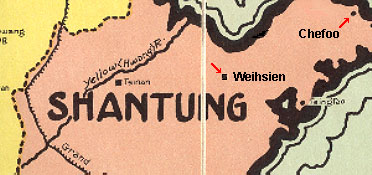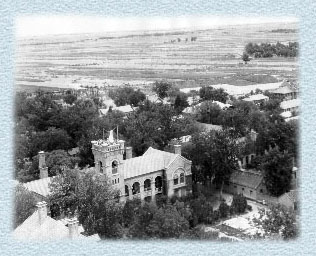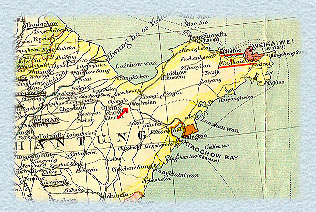 INTERVIEWER: So did the Japanese come into the camp or into the school that day and set up their
administration?
INTERVIEWER: So did the Japanese come into the camp or into the school that day and set up their
administration?

INTERVIEWER: So during the period from '38 to '41...
PHILIPS: We were under the...
INTERVIEWER: ...the Japanese were there.
PHILIPS: ...we were under their protection. Some protection you're comfortable without. And we would have been very comfortable without it. But after Pearl Harbor it was a much closer protection.
INTERVIEWER: So when did the house arrest begin?
PHILIPS: Right after...the day of Pearl Harbor.
INTERVIEWER: Okay.
PHILIPS: And we were to be a prisoner in your own rooms with your own possessions around you. It's very different than being in the other places you go after that.
 INTERVIEWER: So did the Japanese come into the camp or into the school that day and set up their
administration?
INTERVIEWER: So did the Japanese come into the camp or into the school that day and set up their
administration?
PHILIPS: I'm not sure that they did that day. Some of those details are not too clear. We couldn't go off the compound. We weren't locked into our own rooms. The school...the school carried on, more or less normally. But the compound, you couldn't go out onto the streets and so on. And that was right after Pearl Harbor. The day of Pearl Harbor they said, "We'll be very generous with u...with you." They would lend us our property till they could find somewhere else to put us. We thought it would take quite a space. We found it didn't take quite as much as we thought. Nothing we could do but pray anyway, which was the best thing. And often I've heard one or another pray, "Lord, confuse their counsel." Good scriptural prayer. But it's exactly what he did. The army wanted it [the camp]. The navy wanted it. They argued back and forth about who would get it for eleven months while we were under house arrest on our own property. And neither...never could they agree to let the other have it. And when they finally took it, they built a brick wall right down the center. The army took the one side and the navy took the other. That brick wall went right beside my bedroom window.
INTERVIEWER: Which side were you on? Army or navy?
PHILIPS: I don't know [laughs]. We were put out so soon after that and they...they took us over to the Temple Hill property, and that's when we began to be concentrated.
INTERVIEWER: Before I forget, how did the American children and British children get along?
PHILIPS: Very well. They were all one. Of course, when Thanksgiving came, the American children got a holiday to go down to Thanksgiving service. And if there were classes on the British kids had to stay in classes. But it was just at the end of the term and sometimes they were all free, so the American kids got to go, but not the....
INTERVIEWER: Where did they go down to?
PHILIPS: There was a church about a mile from there, the Union Church. And that's where on Sunday mornings we would all together go...well, there was the Union Church, the British and the Americans might go, but there was also an Anglican church here that many of the British went to.
INTERVIEWER: Alright, going back to your departure from Chefoo. How much notice did you have that you were going to be transferred to Temple Hill?
PHILIPS: Well, when we were...with the beginning, they had come to us after eleven months and said you must close the school. We want this building and this one, our two new fireproof buildings. And we knew that something was going to happen. We didn't know what. It was nearing the end of that. And so we...well, we started a week of meetings. We crowded into smaller space, of course. We started a week of meetings for the kids as well as a week for ourselves. Now I didn't mention earlier that on the...the week before Pearl Harbor we had started a week of meetings our British friends called a house party. We would call it a prayer and Bible conference. And so when we were not on duty with the kids we were there at that center. Now when we started a week of meetings for the kids we started another week for ourselves of the same sort. We were not a bunch of backslidden missionaries, but I'm sure that you know it's easy to be so busy doing even in serving the Lord that we fail to be in the Lord's presence. And so we...we felt hungry for revival, a fresh touch in our own hearts from the Lord. And so the burden of our prayer had been revival way back there when the war started. Now it's the burden of our prayer is revival and that's cut off in the middle of the week with an order, "Concentration camp." And that was a rush. We couldn't take our mattresses...our beds. We could take our mattresses and put them on the floor and were told what we could take. The children's boxes were packed according to what they were told they could take. They lined up at the front gate of the compound and marched across the Chinese city singing choruses. One of them they loved to sing was "God is still on the throne, And He'll remember His own. His promise is true, He'll not forget you," and others like that. It was more like a triumphal procession. It wasn't like a bunch of prisoners going into camp. They got over there....
INTERVIEWER: Now where was Temple Hill?
PHILIPS: Well, it was just...it was about little over a mile from us, clear away from the beach.
You see, they're on the beach. We could see what they were doing, and we were too close for
their interest, but this was our property. We were taken over there and we were where we
couldn't see it.
 We had just to imagine what was going on. But we were crowded into smaller
space. I was put in a room...well, I was asked to go with this group. There was a lady past
eighty. There were several in their sixties and seventies who had retired out there on the field. I
I thought they were old folks then. There were two mothers with very young children. Nobody
able to do very much work. They looked around for a perfectly husky able-bodied person, and
asked me to go and cook for a family of forty-eight in an eight-roomed house. They had two
teams of us cooking, so we cooked every other day. But forty-eight in an eight-roomed house.
One was the kitchen, one was the dining room. That meant we were distributed into six rooms.
So we were in...there were four of us lying on the floor here with our mattresses and then there
was a space over here. Perhaps I should tell you, we were told we couldn't take our beds, but
everything was pushed over on hand pushed carts. And I said, "Well, they take off what they
want. I'll put my bed on." And I did. So I got over there with my bedstead as well as the
mattress. But there was a fifty year old lady in our room. I couldn't sleep on that and let her
sleep on the floor, so I slept on the floor like the other young things and she slept on the bed.
And she'd wake up in the morning, she'd snore till the shingles rattled, and then she'd wake up
and she'd say "I didn't sleep a wink all night." [Ericksen laughs] And we thought if she made
that much noise and was awake, we wished she'd try sleeping. Well, anyway, that room was like
that.
We had just to imagine what was going on. But we were crowded into smaller
space. I was put in a room...well, I was asked to go with this group. There was a lady past
eighty. There were several in their sixties and seventies who had retired out there on the field. I
I thought they were old folks then. There were two mothers with very young children. Nobody
able to do very much work. They looked around for a perfectly husky able-bodied person, and
asked me to go and cook for a family of forty-eight in an eight-roomed house. They had two
teams of us cooking, so we cooked every other day. But forty-eight in an eight-roomed house.
One was the kitchen, one was the dining room. That meant we were distributed into six rooms.
So we were in...there were four of us lying on the floor here with our mattresses and then there
was a space over here. Perhaps I should tell you, we were told we couldn't take our beds, but
everything was pushed over on hand pushed carts. And I said, "Well, they take off what they
want. I'll put my bed on." And I did. So I got over there with my bedstead as well as the
mattress. But there was a fifty year old lady in our room. I couldn't sleep on that and let her
sleep on the floor, so I slept on the floor like the other young things and she slept on the bed.
And she'd wake up in the morning, she'd snore till the shingles rattled, and then she'd wake up
and she'd say "I didn't sleep a wink all night." [Ericksen laughs] And we thought if she made
that much noise and was awake, we wished she'd try sleeping. Well, anyway, that room was like
that.
INTERVIEWER: And how long were you st...were you kept at Temple Hill?
PHILIPS: Just about a year. We were moved over [pauses]...whether it was in October or November, moved to Temple Hill, and I think it might have been September, so it probably is ten or eleven months. When we came out we couldn't bring anything of paper, so my diaries suffered. They were kept up to date on the other things, and then when I left I left the diaries that I had with friends who were still there that if it came a time that they should burn them rather than let them be taken, do it but if not to get them back to me. I have them. But some of these places were left vacant.
INTERVIEWER: So when you were transferred from Temp...Temple Hill to Weishien, did you know you were being repatriated or...?
PHILIPS: No, not until after we got there. We were there at Weishien. I think it had been
rumored to us, but I...we didn't know anything. They...we got there to Weishien and were there
about three weeks, I think.
 See, when we went to Weishien, there were already over seventeen
hundred British and Americans there, literally a cross-section of humanity. Some of these young
fellows had left home years before to get rid of that miserable religious influence. They'd got rid
of it. If you met them on the street in Peking or Tientsin they'd have crossed the street rather
than meet a Christian. But now, how far they'd have gone to avoid a missionary, who knows.
But now they were all in distress and difficulty, behind stone walls and barbed wire
entanglements, and they were beginning to find that the Christians had not something but
someone who made a difference, and we know of a number who found the Lord at that time.
How many more, we don't know. Well, we were there, I would say probably two or three weeks.
And by the way, it was during that time that I met Eric Liddell, who was the one pictured in this
film Chariots of Fire. Amazing that he should have such a testimony after all these years. But
anyway, we met...met all of these others and then they posted a list of names. And if you were
on that list of names, you were to come home on the exchange. No possibility of appeal. You
couldn't get off, you couldn't let anybody else go. I'm afraid some of us would have felt there
were those who needed to come home worse than we did. But as usual the Lord knew what He
was doing, even when He guided the Japanese in that. The trip home was the hardest part of all.
If those in frail health had tried to make it, they probably wouldn't have survived. So...but the
list...we didn't know who was coming until that list was posted.
See, when we went to Weishien, there were already over seventeen
hundred British and Americans there, literally a cross-section of humanity. Some of these young
fellows had left home years before to get rid of that miserable religious influence. They'd got rid
of it. If you met them on the street in Peking or Tientsin they'd have crossed the street rather
than meet a Christian. But now, how far they'd have gone to avoid a missionary, who knows.
But now they were all in distress and difficulty, behind stone walls and barbed wire
entanglements, and they were beginning to find that the Christians had not something but
someone who made a difference, and we know of a number who found the Lord at that time.
How many more, we don't know. Well, we were there, I would say probably two or three weeks.
And by the way, it was during that time that I met Eric Liddell, who was the one pictured in this
film Chariots of Fire. Amazing that he should have such a testimony after all these years. But
anyway, we met...met all of these others and then they posted a list of names. And if you were
on that list of names, you were to come home on the exchange. No possibility of appeal. You
couldn't get off, you couldn't let anybody else go. I'm afraid some of us would have felt there
were those who needed to come home worse than we did. But as usual the Lord knew what He
was doing, even when He guided the Japanese in that. The trip home was the hardest part of all.
If those in frail health had tried to make it, they probably wouldn't have survived. So...but the
list...we didn't know who was coming until that list was posted.
For more information about Philips or Collection 314 at the Archives click here.